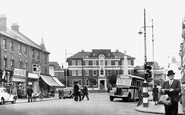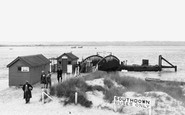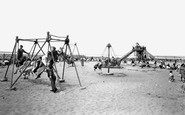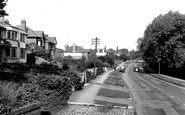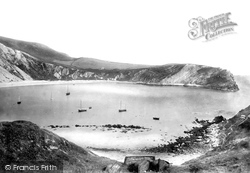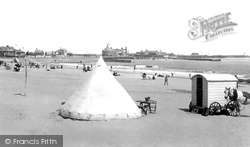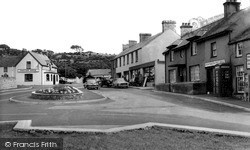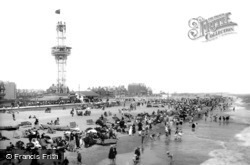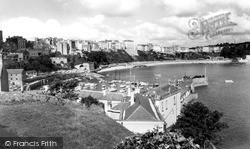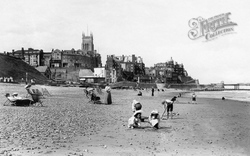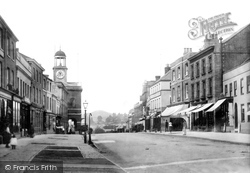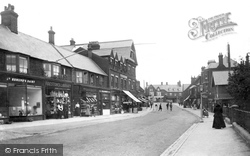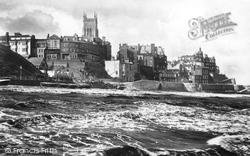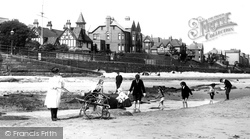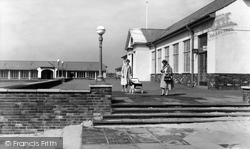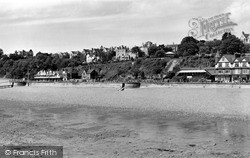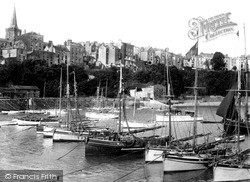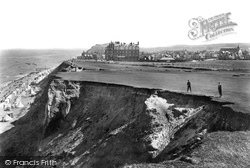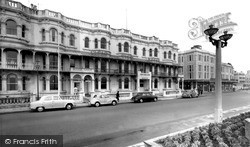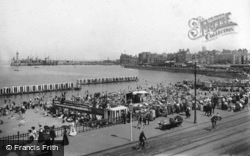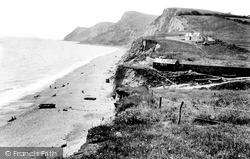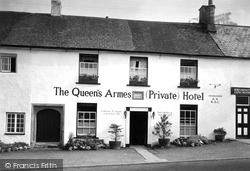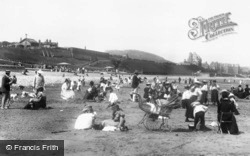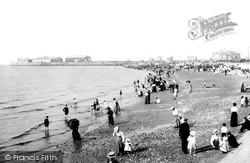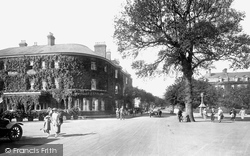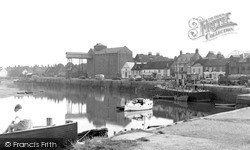Places
1 places found.
Those places high-lighted have photos. All locations may have maps, books and memories.
Photos
11 photos found. Showing results 901 to 11.
Maps
4 maps found.
Books
1 books found. Showing results 1,081 to 1.
Memories
1,362 memories found. Showing results 451 to 460.
Newbridge As A Boy
I recall another Newbridge cinema called the 'Grand' on the way to the Grammar School, down by the river. What a smashing place it was, but it burnt down after a short while - maybe it had something to do with that new ...Read more
A memory of Newbridge on Usk in 1955 by
Meeching Court Farm
My father's aunt and uncle lived in Newhaven. Ted Hoskins was his uncle's name, he was injured in the First World War and later worked at the lighthouse at the end of the breakwater before it was automated. His wife's name was ...Read more
A memory of Newhaven in 1955 by
Grays When It Was A Proper Town.
Despite the cement dust from West Thurrock, if the wind was in the wrong direction, Grays had everything available, from a baking tin to a new car, such a variety of shops. Good bus service, Eastern National, London ...Read more
A memory of Grays in 1955 by
The Happiest Days Of My Life.
I have the fondest memories of Caister on Sea. We used to have a week there every year and my sister and I were the only kids in our street that had a holiday every year. Like most people in the East End of ...Read more
A memory of Caister-on-Sea in 1955 by
Just Like Yesterday !
Wow.. seeing this awesome photograph transports me back in time because in this year I would have been taking this very ferry over from the Southsea side after taking the trolley bus and regular bus from the North End in ...Read more
A memory of Hayling Island in 1955 by
The Copper's Helmet And The Nut Cracker
The ride in the middle of this photograph of the children’s playground on the beach at Southport was known as a ‘copper’s helmet’, and the nearest one on the left was called ‘the nut cracker’. As the ...Read more
A memory of Southport in 1955 by
Can You Help With Information About A Childrens Home On Epping New Road
Can anybody help with information, memories or photos of a former children's home in Epping New Road, in Buckhurst Hill? I spent part of my childhood in a ...Read more
A memory of Buckhurst Hill in 1955 by
Stephen Holmes
I remember my friends and I found ,on blackhall beach some explosives, one of our group (no names no pack drill) made use of them to blow up one of the most popular caves at the rocks, I can still hear the shouts as the ...Read more
A memory of Blackhall Colliery in 1955 by
School Lane & The Grange School
I was born at 60 School lane & would like to know what was on the land prior to our house which I think was built in the early thirties. I attended the Grange School on Bradburns Lane. gray & green uniforms, ...Read more
A memory of Hartford in 1955 by
An Exotic World For Young Canadians
We arrived in Knutsford in September 1955: two bewildered parents and four children, the youngest only 10 months old. My father, a major, had been sent by the Canadian Army to take a year-long course in ...Read more
A memory of Knutsford in 1955 by
Captions
1,130 captions found. Showing results 1,081 to 1,104.
The entrance to this circular natural basin is barely discernible from the sea, guarded as it is by two projecting spurs of resistant Portland and Purbeck strata.
A lone tent sits on the empty sands.
This scene is virtually indistinguishable today: even the tear-shaped flower bed has survived decades of traffic management. The Panton Arms (left) is named after a local antiquarian, Paul Panton.
Always Norfolk's biggest and most popular holiday resort, Great Yarmouth always tried to find the latest attraction.
CASTLE HILL has a commanding view of both the landward and the seaward approaches, and it was almost certainly the location of an Iron Age Celtic promontory fort.
Boasting several large hotels, especially the Hotel de Paris which is right opposite the pier entrance, Cromer had become a very select place to visit.
This view shows the western end of East Street, with a closer look at the Town Hall clock-tower and cupola, and Colmer`s Hill forming the conical eminence in the distance (centre).
Hunstanton is unique for north Norfolk resort towns in that it looks west across the sea and not east. It was a quiet village of simple fishermen's cottages until the coming of the railway in 1862.
With its imposing 160ft-high tower, Cromer church was erected in the reign of Henry IV and dedicated to St Peter and St Paul.
Playing on the sands seems to be an enjoyment forgotten today, but here these youngsters certainly seem to be enjoying themselves on Egremont beach.
Despite a number of attempts at regeneration, the Lido at Ainsdale was an early casualty of the national move to overseas holidays.
With the last significant addition to the Esplanade being the Italian Gardens of the 1920s, only the cars (far right) betray this photograph's modernity.
This view shows the western end of East Street, with a closer look at the Town Hall clock-tower and cupola, and Colmer`s Hill forming the conical eminence in the distance (centre).
Tenby is probably the most recognisable seaside town in Wales.
Difficult though golf is, the natural hazard of crumbling cliffs on the edge of Sheringham Golf Links normally ensures that golfers practice their accuracy. Here we have two who have not!
Unlike the Stanhoe Hotel, the Clear View was typical of the small to medium-sized hotels that had been built on the former open spaces and lawns of the Georgian resort.
Benjamin Beale, a local glovemaker and a Quaker, invented the bathing machine in 1751 to conserve ladies' modesty while they took a dip in the briny.
This view shows Eype Mouth, looking westwards to what is now a National Trust skyline, with Ridge Cliff and Doghouse Hill rising into the 508-feet summit of Thorncombe Beacon (centre).
Note the inscriptions on either side of the door and the plaque above it.
This popular seaside resort sits in a wide sweep of bay on the north coast, with wooded hills behind the promenade, which fronts miles of safe sandy beach.
Our late Victorian visitors were presented with a pebbly beach. We can see the stone jetty in the distance: it was still the main anchorage for ships when our photograph was taken.
Along with the building to the left, it is now part of an amusement arcade, yet much of the original façade remains intact.
Benjamin Beale, a local glovemaker and a Quaker, invented the bathing machine in 1751 to conserve ladies' modesty while they took a dip in the briny.
The Great Eastern Railway Company developed the quayside, and freight trains rolled under the high platform of the tall granary warehouse to receive produce.
Places (1)
Photos (11)
Memories (1362)
Books (1)
Maps (4)


